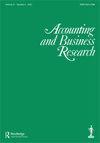“人类世的会计”:从业者的观点
IF 1.4
4区 管理学
Q2 BUSINESS, FINANCE
引用次数: 0
摘要
当我读到Bebbington和Rubin(2022)时,它非常令人耳目一新地说,我们正处于旅程的开始,你不会假装知道答案。你说这篇论文提供了一个包含多个问题的框架。这感觉有点轻描淡写,因为这里世界观的转变令人难以置信。论文的一个核心观点是,人类世是我们星球历史上独一无二的时期。这是因为我们是正在发生的事情的建筑师,我们知道这一点。首先,我们可以将我们的世界概念化,并将其理解为一个相互关联的影响和依赖网络。其次,我们意识到我们正在对这个星球做什么,如果我们现在不采取行动,我们将灭绝,并带走地球上的许多生命。另一件让我印象深刻的事情是,与风险有多高相比,这段被称为人类世的时期有多小。人类世的叙述往往明显是负面的,带有“我们都注定要失败”的意味,我从你的演讲中得到了一个真正积极的东西:我们有机会,我们有能力把它做好。我对这篇论文和它所基于的P.D.Leake讲座的最初反应是,我内心的乐观主义者说我相信我们会达到目标,而悲观主义者说我们将经历一段极其坎坷的旅程,我们可能不会采取行动,直到事情变得更糟——或者可能更糟。我想到了许多问题,但我把它们提炼成了三个主题。一个是,在系统中对世界进行概念化,颠覆了我们对世界的整洁、分类和机械感,将事物分为不同和不相连的桶。它使我们的理解从复杂变为复杂。第二,它使我们对公司治理的认识由内而外。第三,它使会计变得非常困难,因为它不再是对实体的会计,而是对实体与世界和社会的关系的理解。这对会计有很大的影响。举第一点来说:我们对世界的理解是不是已经天翻地覆了?我说复杂和复杂。如果有什么东西很复杂,你可以把它拆开,修理本文章由计算机程序翻译,如有差异,请以英文原文为准。
‘Accounting in the Anthropocene’: A practitioner view
When I read Bebbington and Rubin (2022), it very refreshingly said we are at the start of a journey and that you do not pretend to have the answers. You say the paper provides a framing with multiple questions. This feels like a bit of an understatement because the shift in world views that is embedded here is quite mind-boggling. A core idea in the paper is that the Anthropocene is like no other period in the history of our planet. This is because we are the architects of what is happening, and we know it. First, we can conceptualise and understand our world as an interconnected web of impacts and dependencies. Secondly, we are conscious of what we are doing to the planet and if we don’t act now, we will become extinct and take a lot of life on Earth with us. The other thing that struck me was just how tiny this period of time called the Anthropocene is, when compared with how high the stakes are. The narrative of the Anthropocene is often distinctly negative, with overtones of ‘We’re all doomed’ and one thing I took from your lecture was a real positive: we have an opportunity and we have the capacity to get it right. My initial reaction to the paper and to the P.D. Leake lecture on which it is based was that the optimist in me says I believe we will get there, while the pessimist says that we are in for an incredibly bumpy ride and we probably will not act until things get worse – or maybe a lot worse. Many questions came to mind, but I have distilled them into three themes. One is that conceptualising the world in systems turns upside-down our neat, categorised, mechanistic sense of the world that separates things into distinct and unconnected buckets. It shifts our understanding from being complicated to complex. Second, it turns our sense of corporate governance inside out. Third, it makes accounting incredibly difficult because it is no longer about accounting for the entity, but about making sense of how that entity relates to the world and to society. That has huge implications for the accountant. To take the first point: has our understanding of the world just been turned upside-down? I said complicated and complex. If something is complicated, you can take it apart, repair the
求助全文
通过发布文献求助,成功后即可免费获取论文全文。
去求助
来源期刊

Accounting and Business Research
BUSINESS, FINANCE-
CiteScore
3.40
自引率
11.80%
发文量
38
期刊介绍:
Accounting and Business Research publishes papers containing a substantial and original contribution to knowledge. Papers may cover any area of accounting, broadly defined and including corporate governance, auditing and taxation. However the focus must be accounting, rather than (corporate) finance or general management. Authors may take a theoretical or an empirical approach, using either quantitative or qualitative methods. They may aim to contribute to developing and understanding the role of accounting in business. Papers should be rigorous but also written in a way that makes them intelligible to a wide range of academics and, where appropriate, practitioners.
 求助内容:
求助内容: 应助结果提醒方式:
应助结果提醒方式:


